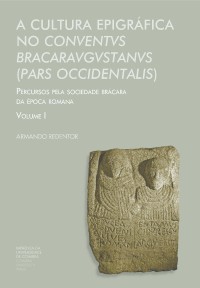Please use this identifier to cite or link to this item:
https://hdl.handle.net/10316.2/42775| Title: | A cultura epigráfica no conventvs Bracaravgvstanvs (pars occidentalis): percursos pela sociedade brácara da época romana. Vol. I | Other Titles: | Epigraphic culture in conventvs Bracaravgvstanvs (pars occidentalis): paths through bracarian society of the roman period. Vol. I | Authors: | Redentor, Armando | Keywords: | epigraphy;society;western conventvs Bracaraugustanus;roman period;epigrafia;sociedade;ocidente do conventvs Bracaraugustanus;época romana | Issue Date: | 2017 | Publisher: | Imprensa da Universidade de Coimbra | Abstract: | The Roman occupation of the Iberian northwest led to the emergence of the epigraphic habit, a new practice of cultural communication introduced by the imperial administration and its agents. Local peoples rapidly adopted this trend, which was disseminated through its social elites. As a form of communication, epigraphs were mainly used for both individual and communal celebrations and self-representations. The material that is evidence of this practice, the engraved surfaces with writings on a variety of topics, are today privileged sources that enable us to address the challenges posed by the study of the societies of classical antiquity, despite the fact that they can provide only a fragmentary picture of the world from which they arise.
These are the main concerns of this research, which focuses on southern Callaecia. From a starting point of the review of the epigraphic data originating from western Bracarensis, an attempt has been made to clarify its nature, chronology and representativeness, investigating some of the markers of the society that gave life to the territory, settlements and roads they were connected by during Roman rule. Com o dealbar da época romana no Noroeste hispânico, assiste-se à irrupção do hábito epigráfico, novel prática em termos de cultura comunicacional introduzida pela administração imperial e seus agentes e que depressa se entranha no modo de estar das populações locais, mormente por via das suas elites. Tratando-se de forma de comunicação que visou, em grande medida, a comemoração e auto-representação individuais, mas também de colectividades, a materialidade desse exercício, plasmada nos suportes gravados com textos de finalidade diversa, serve-nos hoje como fonte privilegiada para afrontar os desafios que a construção de conhecimento sobre as sociedades da Antiguidade encerra, ainda que aí não se reflicta o todo social. É este o mote da investigação encetada no contexto territorial calaico meridional. Partindo da revisão do dossiê epigráfico do Ocidente brácaro e da clarificação da sua natureza, cronologia e representatividade, percorrem-se alguns dos marcadores da sociedade que vivificou, em época romana, o território, os núcleos de povoamento e as artérias que o uniram. |
URI: | https://hdl.handle.net/10316.2/42775 | ISBN: | 978-989-26-1269-0 978-989-26-1270-6 (PDF) |
DOI: | 10.14195/978-989-26-1270-6 | Rights: | open access |
| Appears in Collections: | Pombalina |
Files in This Item:
| File | Description | Size | Format | |
|---|---|---|---|---|
| cultura_epigrafica_vol_i.pdf | 5.83 MB | Adobe PDF |  |
Items in DSpace are protected by copyright, with all rights reserved, unless otherwise indicated.
